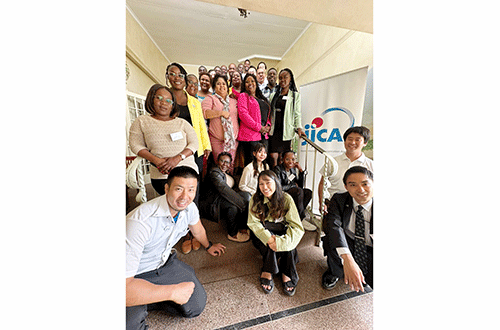Making mathematics fashionable

Source: New Era Live
SWAKOPMUND - The Japan International Cooperation Agency (JICA) is committed to addressing issues that educators face in Namibia by closely working with relevant educational institutions to ease and reduce the poor performance rates of learners.
The agency recently hosted a mathematics education workshop in Swakopmund, roping in more than 20 mathematics teachers from schools in various circuits to address issues around the subject.
Some of the issues raised by the educators include the maths content being "too much", little time for learners to do class activities, teachers lacking maths understanding, and ultimately the training of certain topics, language barriers, reading
and understanding, and many others.
Dordabis Primary School principal Ronnellie Guriras said she realised that some teachers do not know how to interpret the curriculum.
"They have a challenge of interpreting the curriculum and sometimes, especially in primary education. They do not know how to set up quality exam question papers according to what is prescribed in the curriculum," said the qualified mathematics teacher.
Guriras noted that although there is little improvement in the performance of learners in maths, more needs to be done to make maths a more lovable subject in schools, especially considering that the problem does not only lie with the pupils, but the teachers as well.
"There is this programme called continuous professional development, where the ministry saw a need for teachers to be exposed to alternative methods of educating the subject. I feel that schools must utilise this," she stressed.
Guriras added: "Where you (schools) see a need, where teachers need training, you can invite experts in that specific field, whether it's in anxiety for mathematics, there are professionally qualified people who can offer how teachers can cope with that."
"Mathematics teachers are known to be very uptight and very strict. So, I advise them to bring fun into the mathematics classroom. Let the children develop trust in this subject through fun, and it can be games that we used to play as children. You can use those games as a starting point. So, obviously, when the child is familiar with the game, you can use this game as a point of departure before you start with your lessons," she hinted.
Khomas chief education officer Martin Mateus said the continuous professional development workshops for training teachers are important, as there is a need for them to improve their knowledge in various subjects.
"We keep revamping their knowledge, skills and expertise because we believe that when a teacher leaves university and we send them to schools, there are certain gaps. Things change, so you have to keep them in touch with the newest education methods of teaching," said the educator, who oversees biology and science.
He added that mathematics
is a big concern, and that's why they teamed up with JICA to hear the plight of teachers, and how they can improve on performances.
"Among all the subjects that we offer, mathematics is one of those which has challenges. This is evident from the results that were released recently. In maths paper three ordinary level, many learners at a particular school got a 0. That's why we cannot only tackle mathematics at the secondary level, we must start with junior primary," emphasised Mateus.
He noted that if learners are not well trained at the foundation level, they are less likely to do any better at the secondary school level.
He took note of the plight of teachers who raised issues around the content for the ministry to try and shorten it so that teachers can finish the syllabus on time to avoid teaching after school, just to squeeze in extra time or during holidays.
"We have a circular on staffing norms, which indicates the number of learners per teacher. At the primary level, a teacher is supposed to have 35 learners, at the secondary level, it is reduced to 30 learners per teacher. But now, we have found ourselves where teachers are dealing with 40 to 45 learners," he said, adding that to some extent, this hampers the effectiveness of teaching.
JICA is committed and continues to plough into the education sector through various means to ensure that educators are equipped to diligently carry out their work.
Edmunda de Sousa, the JICA Namibia officer for the Volunteer and Knowledge Co-Creation Programmes, said these workshops are important to transfer skills and knowledge from the JICA volunteers to the teachers, and vice versa.
"It creates a platform for sharing and comparing
teaching methodologies. The aim is to find leading solutions for mathematics challenges, and to share solutions for difficulties in teaching mathematics," stated De Sousa.
